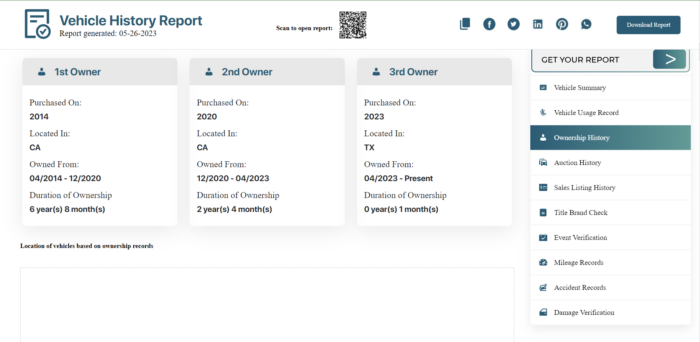Knowing how to import a car can be an exciting endeavor, offering you the opportunity to acquire a vehicle that may not be readily available in your local market. Whether you’re interested in Japanese import cars known for their reliability or considering a US car import to access a specific model, one critical aspect that should never be overlooked is the car’s history. A comprehensive car history report can be your best friend in this process, helping you affirm the car’s condition, reliability, and value. In this guide, we will explore and emphasize the importance of obtaining a car history report.
Why Choose Car Imports?
Before knowing how to import a car, it’s essential to understand why so many enthusiasts and buyers choose this route:
- Access to Unique Models: Car imports allow you to access unique or rare models that may not be available in your local market. This is particularly attractive to collectors and enthusiasts.
- Cost Savings: In some cases, importing a car can be more cost-effective than purchasing a similar model locally, especially when considering factors like taxes, tariffs, and availability.
- Variety of Options: Different countries have their own automotive preferences and regulations. Importing a car opens up a world of options, whether you’re seeking a fuel-efficient Japanese import or a powerful American muscle car.
- Quality and Condition: Certain regions are known for producing cars with exceptional build quality and reliability. Importing a car from one of these regions can be an assurance of superior craftsmanship.

The Crucial Role of a Car History Report
A car history report is a vital tool in the importation process by playing the following crucial roles:
- Transparency and Trustworthiness: A car history report provides transparency about the vehicle’s past, including accidents, mileage records, ownership history, title status, and more. This information verifies the accuracy of the seller’s claims, fostering trust in the transaction.
- Quality Assessment: By examining the car’s history, you can assess its overall quality and condition. This is crucial to ensure that the vehicle meets your expectations and is worth the investment.
- Value Determination: Understanding the car’s history allows you to accurately determine its value. This knowledge empowers you to negotiate a fair price and avoid overpaying for the vehicle.
- Risk Identification: A car history report enables you to identify potential risks associated with the vehicle. This includes uncovering issues that could lead to financial losses or safety concerns.

How to Obtain a Car History Report
To obtain a car history report, follow these steps:
- Identify the Vehicle Identification Number (VIN): The VIN is a unique code assigned to each vehicle. You can typically find it on the car’s dashboard near the windshield or on the driver’s side door jamb. Once you have the VIN, you’re ready to request a report.
- Choose a Reliable Provider: Select a reputable car history report provider. Some well-known options include Detailed Vehicle History, Carfax, AutoCheck, and other regional or national services. Ensure that the provider offers comprehensive reports that include the information you need.
- Request the Report: Enter the VIN on the provider’s website or app and request the car history report. You may need to pay a fee for the report, but the investment is well worth it for the valuable information it provides.
- Review the Report: Once you receive the report, carefully review all the information. Pay attention to any red flags, such as accident records, title issues, or odometer discrepancies. Compare the report’s details with the seller’s claims.
- Ask Questions and Seek Clarification: If you have any questions or concerns about the information in the report, don’t hesitate to reach out to the seller for clarification. It’s essential to have a clear understanding of the vehicle’s history before proceeding with the purchase.
What’s Contained in a Car History Report
A typical car history report contains several key elements:
- Accident History: The report will detail any accidents or damage the vehicle has been involved in. This includes information about the severity of the accidents and whether the car was declared a total loss.
- Title Information: The report will provide title information, including the current title status and any title issues such as salvage or rebuilt titles.
- Odometer Records: You’ll find records of the car’s odometer readings over time. This helps verify the accuracy of the mileage and ensures there are no odometer rollbacks.
- Ownership History: The report will list the vehicle’s ownership history, including the number of previous owners and the length of time each owner held the car.
- Service and Maintenance Records: Some reports may include information about the car’s service and maintenance history. This can give you insights into how well the vehicle was cared for.
- Recalls and Lemon History: The report may include information about any recalls that apply to the vehicle. Additionally, it may indicate whether the car has a history of being a lemon (a vehicle with recurring defects).
Importing a car can be a rewarding experience, but it comes with its share of challenges and risks. To ensure that you import a car in good condition, a car history report is an indispensable tool in your arsenal.. By obtaining a comprehensive car history report, you can make informed decisions and confidently proceed with your car importation and even car exports, whether you’re bringing in a Japanese import car, a US car import, or any other vehicle from around the world.










